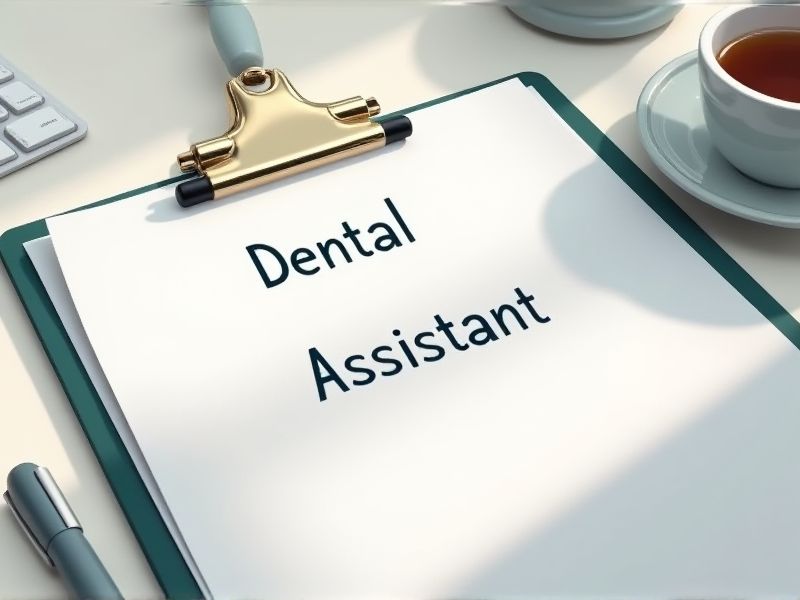
Dental Assistants play a critical role in maintaining and enhancing oral healthcare, requiring specialized knowledge and skills to ensure efficient dental operations. Certifications in infection control, radiography, and CPR equip them with necessary competencies to uphold safety standards and improve patient care. These certifications also bolster a Dental Assistant's credibility and employability in a competitive field. Below are some essential certifications that may be required for a Dental Assistant.
Certified Dental Assistant (CDA)
Certification as a Dental Assistant validates a professional's knowledge and competence, ensuring adherence to industry standards. Without certification, dental assistants may lack the formal training necessary for efficient patient care and procedural support. Certified Dental Assistants are equipped with the knowledge to perform expanded functions, enhancing the overall operational efficiency of dental practices. Certification often improves employment opportunities and wage potential, reflecting a commitment to professional development.
Certified Radiology Dental Assistant (CRDA)
The role of a Certified Radiology Dental Assistant (CRDA) ensures that dental assistants are proficient in executing radiographic procedures with precision, leading to accurate diagnoses. Without this certification, the risk of radiation exposure increases due to improper handling, potentially compromising patient safety. Dental practices prioritize CRDAs as they contribute to maintaining high standards in patient care and operatory efficiency. CRDAs enhance the overall workflow by allowing dentists to focus on more complex procedures, knowing the imaging tasks are performed correctly.
OSHA Bloodborne Pathogens Certification
Dental assistants face potential exposure to infectious materials, making the OSHA Bloodborne Pathogens Certification essential for ensuring their safety. Acquiring this certification equips them with crucial knowledge on preventing disease transmission in the dental setting. Compliance with OSHA regulations helps dental practices avoid legal issues and potential fines. Implementing certified safety protocols fosters a safer environment for both patients and healthcare workers.
CPR Certification
Dental assistants frequently work in close proximity to patients who may experience medical emergencies during dental procedures, necessitating CPR certification. Many dental offices and state regulations require CPR certification as part of standard compliance for healthcare providers, including dental staff. Possessing CPR skills ensures that a dental assistant can effectively respond to emergencies, enhancing patient safety and care quality. CPR certification also broadens a dental assistant's professional competencies, making them more valuable to their employers.
First Aid Certification
Completing first aid certification equips dental assistants with critical skills to manage medical emergencies, such as potential allergic reactions or sudden cardiac events, which can occur in a dental setting. Understanding basic life support procedures ensures a safer environment for both patients and dental staff, maintaining the clinic's reputation for comprehensive care. By mastering these vital techniques, dental assistants increase their professional value and expand their career opportunities within healthcare. Regulatory authorities often mandate first aid training for compliance with healthcare safety standards, emphasizing its significance in dental practice operations.
HIPAA Compliance Certification
HIPAA Compliance Certification is needed for a dental assistant to ensure they understand how to handle patient information with confidentiality. The certification provides knowledge on safeguarding electronic health records from unauthorized access. Lack of compliance could lead to legal penalties for the dental practice and damage to its reputation. Understanding HIPAA regulations enhances trust between patients and healthcare providers, essential for effective care.
Infection Control Certification
Infection Control Certification ensures dental assistants understand and adhere to protocols that prevent the spread of infectious diseases in clinical settings. This certification provides them with the knowledge to maintain a safe environment for both patients and staff. Regulatory compliance is another important aspect, as healthcare facilities must meet strict infection control standards to operate. Patient trust and satisfaction often increase when dental practices are known for their rigorous infection prevention strategies.
Dental Office Administration Certification
Earning a Dental Office Administration Certification equips dental assistants with specialized knowledge in managing patient records and appointment scheduling, directly impacting the efficiency of a dental practice. Enhanced understanding of billing procedures and insurance claims reduces errors, facilitating smoother financial operations. Certified assistants are better prepared to handle patient interactions and compliance with health regulations, crucial for maintaining professional standards. Possessing the certification often leads to career advancement opportunities and increased job satisfaction within the dental field.
Dental Practice Management Certification
Dental Practice Management Certification equips dental assistants with skills to efficiently manage administrative tasks, which can streamline clinic operations. Certification helps in understanding financial aspects of dental practice, leading to improved budgeting and resource management. Having this credential can increase a dental assistant's career prospects and earning potential as it demonstrates a higher level of competence. Enhanced communication and leadership skills gained through certification can foster better team dynamics and patient interactions.
Dental Digital Imaging Certification
The certification in dental digital imaging ensures that dental assistants are trained to use modern radiographic technology, leading to more accurate patient diagnostics. As dental practices increasingly adopt digital systems, possessing a certification becomes essential for maintaining productivity and efficiency. With sufficient training and certification, the risk of errors in image capture and interpretation decreases, enhancing patient safety. The certification also positions dental assistants more competitively in the job market, as it demonstrates proficiency in a crucial area of dental care.
Summary
By obtaining certifications, you enhance your professional credibility and increase your employability as a Dental Assistant. Employers recognize your advanced skill set, often leading to higher salary offers and more job opportunities. You gain specialized knowledge that can lead to improved patient care and greater job satisfaction. With certifications, career advancement becomes more attainable, allowing you to potentially transition into roles with more responsibility.
